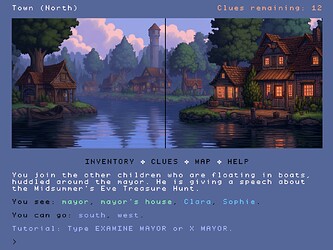Thanks for posting this about your AI experiences. A lot of people have been telling me to use AI. Apparently, it’s the thing. Or soon will be!
Aside from ethics, my reservations have been mostly along the lines of the problems you describe in your blog posts. so thanks for writing that up.
My guess is that your consistency was largely down to asking for it all to be like “Monkey island”. Having a style anchor point like that could work, albeit with a lot of editing. But without a style anchor, you’re stuffed!
For info, I’m currently using 3D for my artwork. it’s a lot of work, but on the upside, once i have a scene built, i get a lot of art from it;
For example:
- multiple viewpoints
- easy to change or rearrange the content to reflect game change
- character consistency.
- re-render bits when i suddenly realise the game design has to change!
Once I’ve built a character, i can pose them in scenes how i wish with 100% consistency between views.
Recently, i tried making a promo video. It was a simple 360 cam flyby of an existing scene with a bit of character animation. I thought to myself: How would you do this with AI?
3D doesn’t give me that “drawing” look, which AI does do very well. Personally, i prefer the “realistic” look. But it’s entirely a matter of taste (and to some extent game genre).
And;
To catch up with what people are saying about ethics, I’d like to point out something the other way around;
One of my concerns is AI generating a result that happens to have taken too much out of something copyright out there. How would I know, unless I’ve seen it before?
Let me give an example from the text based chat prompts:
I asked chatgpt to invent an original joke about pirates. It said:
Q: What do you call a pirate with two arms and two legs?
A: a rookie!
Actually quite witty. BUT, it’s not original, I’ve head it before (maybe with slightly different words), but it hasn’t been “invented” by AI.
How do i know that’s also not happening with “generated” AI art? Next up, someone says, “Hey that’s the castle from Disney Island”, or something. Then what?
